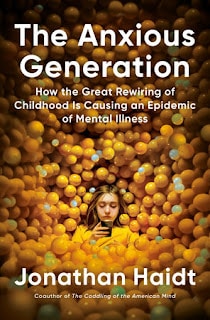« We are forever elsewhere, » wrote MIT Professor Sherry Turtle in 2015 about our new life with smartphones. She is quoted approvingly by Social Psychologist Jonathan Haidt in his latest book, The Anxious Generation: How the Great Rewiring of Childhood Is Causing an Epidemic of Mental Illness (NY: Penguin Random House, 2024). According to Haidt, « a profound transformation of human consciousness and relationships » occurred between 2010 and 2015. This was « the birth of the phone-based childhood » and it marked « the definitive end of the play-baed childhood. »
Haidt is hardly alone in lamenting these developments. Even the Holy See has joined the growing chorus of concern. In the newly released Declaration Dignitas Infinita, issued by the Dicastery for the Doctrine of the Faith just this week, we read: « Although the advancement of digital technologies may offer many possibilities for promoting human dignity, it also increasingly tends toward the creation of a world in which exploitation, exclusion, and violence grow, » and « the more that opportunities for making connections grow in this realm, the more people find themsleve isolated and impoverished in interpersonal relationships » [DI, 61].
Haidt is the author of The Righteous Mind: Why Good People are Divided by Politics and Religion (2012) and co-author with Greg Lukianoff of The Coddling of the American Mind: How Good Intentions and Bad Ideas Are Setting Up a Generation for Failure (2018). His current book continues themes explored in the latter book.
Haidt highlights two components of the current crisis. The first was the end of the play-based childhood which has been characteristic of human beings for most of our history, right up until the end of the 20th century, when society suddenly started overprotecting children from he normal stresses of growing up. Traditional childhood was all about « the kinds of experiences humans evolved for and that they must that have in abundance to become socially functional adults. » These include « the social skills necessary for life in a democratic society, including self-governance, joint decision making, and accepting the outcome when you. lose a contest. » The recent move toward trying to raise children « in a bubble of satisfaction, protected from frustration, consequences, and negative emotions » Haidt argues, « may be blocking the development of competence, self-control, frustration tolerance, and emotional self-management. » What’d Haidt calls « the 1990s turn to paranoid parenting » was facilitated, he contends, by what British sociologist Frank Furredi has called « the breakdown of adult solidarity. » By now, we are well familiar with this critique of a social tendency and direction which preceded the smartphone and the phone-based world we now live in.
The second component of the current crisis, Haidt suggests, is that while overprotecting children and young people from the challenges of the real world, we have lately under-protected them from « the Wild Wes too the virtual world, where threats to children abounded. » Among the harms he identifies are social isolation, sleep deprivation, attention fragmentation, and addiction. Again, unless one has willfully failed to observe what has been happening, none of this is surprising news.
Haidt also highlights the specific but different harms being done to girls and to boys. His data demonstrate that girls are more adversely affected by social comparison and perfectionism a suffer more from relational aggression than boys. Meanwhile, « the rise of safetyism in the 1980s and 1990s hit boys harder than girls, » while boys’ increasing involvement with multiplayer video games in the 2000s and then with smartphones in the 2010s « pulled boys decisively away from face-to-face or shoulder-to-shoulder interaction. » This is contributing to the ongoing « friendship recession » among men. « In the 1990s, only 3% of American men reported having no close friends. By 2021, that number had risen fivefold to 15%. »
Haidt calls Emile Durkheim « the most profound thinker about the nature of society, »and reflects Durkheim’s concern about anomie, « an absence of stable and widely shared norms and rules. » Following Durkheim, Haidt highlights how « the strongest and most satisfying communities come into being when something lifts people out of the lower level so that they h av powerful collective experiences. … People who live only in networks, rather than communities, are less likely to thrive. »
So, now, we know what we have been doing wrong. What, if anything can be done about it to correct it? Schools, from elementary through high school level, Haidt argues, « should go phone-free to improve not only mental health but academic outcomes as well. » Outside of school, children should again experience real-world freedom. He favors the movement for « Reasonable Childhood Independence » Laws, but he believes schools have a special part to play in this. « Re-normalizing childhood independence requires collective action, and collective action is most easily facilitated by local schools. Parents, of course, are also primary players in this process, and Haidt provides detailed recommendations for changed parental behavior. In sum, his « four foundational reforms » are:
1. No smartphones before high school
2. No social media before age 16
3. Phone-free schools
4. Far more unsupervised play and childhood independence.
Haidt concludes that what he calls « the Great Rewiring of Childhood, from play-based to phone-based, has been a catastrophic failure » and that it is « time to end the experiment » and « bring our children home. »




